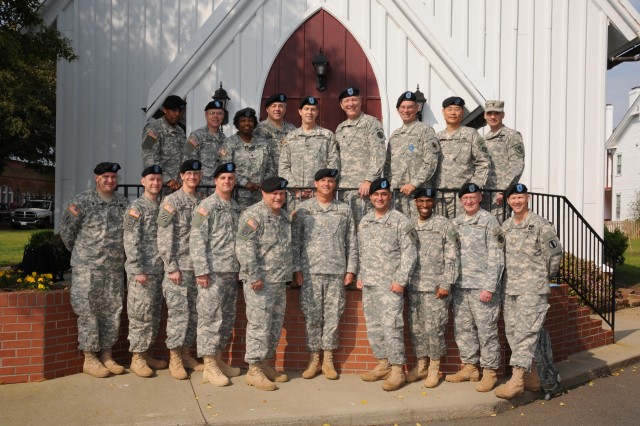FORT MONROE, Va. (TRADOC News Service, May 5, 2008) -- Military chaplains and ethics teachers came together for the Training and Doctrine Command Chaplain Service School Instructor Development Training from April 28 to May 2 at Fort Monroe, Va., to discuss how morals and ethics of each Soldier reflect upon the whole Army.
This was a time of fellowship and dialogue for 17 ethics teachers, Army Service School chaplains and a Navy chaplain as they discussed the changes an era of persistent conflict will bring to the Soldier's growth and how it relates to a Soldier's job. Guest speakers included Gen. William Wallace, TRADOC commanding general; Maj. Gen. James Chambers of the U.S. Army Transportation School; Dr. John Brinsfield of the U.S. Army Chaplain Center and School; and Dr. Don Snider of the United States Military Academy at West Point, N.Y.
"You and I are in the character-protecting business," said Col. Richard Garrison, TRADOC command chaplain "It's the incredible privilege and blessing of what we've been called to do."
While chaplains understand that many Soldiers choose not to associate themselves with a faith, leaders address the role spirit and morals play in ultimately driving the decision-making process.
In his welcome remarks, Wallace reminded the group that Soldiers are held to a higher standard and a higher call, and that "military chaplains are the right people to be teaching our Soldiers about morals and ethical decision-making."
"Our character breeds choices, and our choices breed character," said Garrison. "Absence of strong character topples those in the limelight because they can't overcome the limitation of their character."
Character and ethical decision-making fuel Army professionalism, which determines how a Soldier approaches the day-to-day, claimed Lt. Col. Donald Eubank, TRADOC deputy command chaplain. Professionalism, as mentioned in the Soldiers Creed, is demonstrated by how a Soldier approaches the hardships of war: physical, spiritual and mental fatigue.
"Every time something bad happens to you,... you lose something through the trial and stressors of life. What do we do with that' I believe we have to appropriately deal with that loss," said Eubank.
Professionalism is built by character-driven, ethical decision-making. In times of war, loss is unavoidable, according to Eubank. Wars in Afghanistan and Iraq have exposed the American public to the challenges of a non-traditional war, but Soldiers committed to their job understand the accountability they have to our country.
Snider raised the point, "Who gets to decide if you're a professional or not' The client does. The American people. And you will know whether or not they think you're a professional by the way they treat you - like a profession or a bureaucracy. ... If you win their trust, you can perform as a professional."
This means all the more to an Army that is held to a higher standard regarding professionalism.
Training and roundtable discussions like these allow chaplains and ethics teachers to discuss the future of our Soldiers' moral and ethical fabric and how this fabric is woven into the Army's mission.
The TRADOC Chaplain Service School Instructor Development Training serves as a reminder that it takes more than physical training and technical skills to be Army Strong. The character to make ethical decisions show that professionalism and effectiveness are critical to the Army at war.
"Development of military doctrine and expertise and promoting the right choices during the heat of battle are essential to a successful American Army," said Snider.


Social Sharing